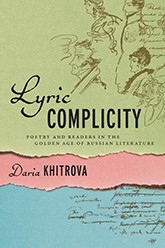|
Lyric Complicity
Poetry and Readers in the Golden Age of Russian Literature
Daria Khitrova
Publications of the Wisconsin Center for Pushkin Studies
David M. Bethea, Series Editor
“We need this book. It addresses a number of important issues that most literary critics and scholars have been aware of, but that no one has attempted to bring together. Moreover, it offers a bold cumulative interpretation of Russian poetic culture of the so-called Golden Age.”
—Ilya Vinitsky, Princeton University
For many nineteenth-century Russians, poetry was woven into everyday life—in conversation and correspondence, scrapbook albums, and parlor entertainments. Blending close literary analysis with social and cultural history, Daria Khitrova shows how poetry lovers of the period all became nodes in a vast network of literary appreciation and constructed meaning. Poetry during the Golden Age was not a one-way avenue from author to reader. Rather, it was participatory, interactive, and performative.
Lyric Complicity helps modern readers recover Russian poetry’s former uses and functions—life situations that moved people to quote or perform a specific passage from a poem or a forgotten occasion that created unforgettable verse.
 Daria Khitrova is an associate professor of Slavic languages and literatures at Harvard University. Her areas of specialization include nineteenth-century Russian literature and culture, Formalist poetics, twentieth-century theater and dance, and Russian and European modernism. She has published articles and book chapters on the poetry of Evgeny Baratynsky, Mikhail Kuzmin, and Alexander Pushkin.
Daria Khitrova is an associate professor of Slavic languages and literatures at Harvard University. Her areas of specialization include nineteenth-century Russian literature and culture, Formalist poetics, twentieth-century theater and dance, and Russian and European modernism. She has published articles and book chapters on the poetry of Evgeny Baratynsky, Mikhail Kuzmin, and Alexander Pushkin.
Praise
“Engaging and lucid prose.”
—Choice
“Khitrova is a sensitive reader, and she writes provocatively, incisively, at times even wittily. She is extremely knowledgeable about both primary literature and secondary sources.”
—Michael Wachtel, author of A Commentary to Pushkin’s Lyric Poetry, 1826–1836
“Very successfully shows the profound entanglement of poetry production, active consumption, and everyday life in Russia in the first thirty years of the nineteenth century.”
—Ab Imperio
“An important and highly stimulating piece of scholarship which will help modern readers grasp the full complexity and subtlety of Golden Age writing, and provide a model for pragmatic studies of verse in different cultures and periods.”
—Australian Slavonic and East European Studies
|

Larger images
New in Paperback!
June 2021
LC: 2018046040 PG
312 pp. 6 x 9
1 b/w photo
|

